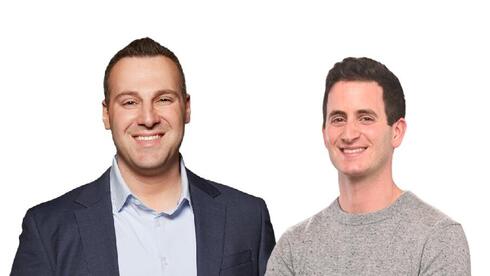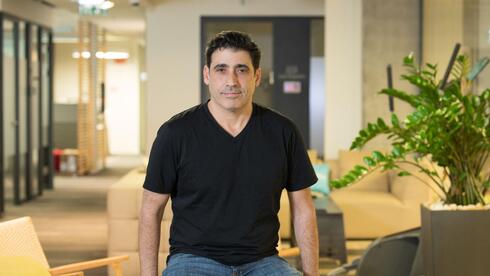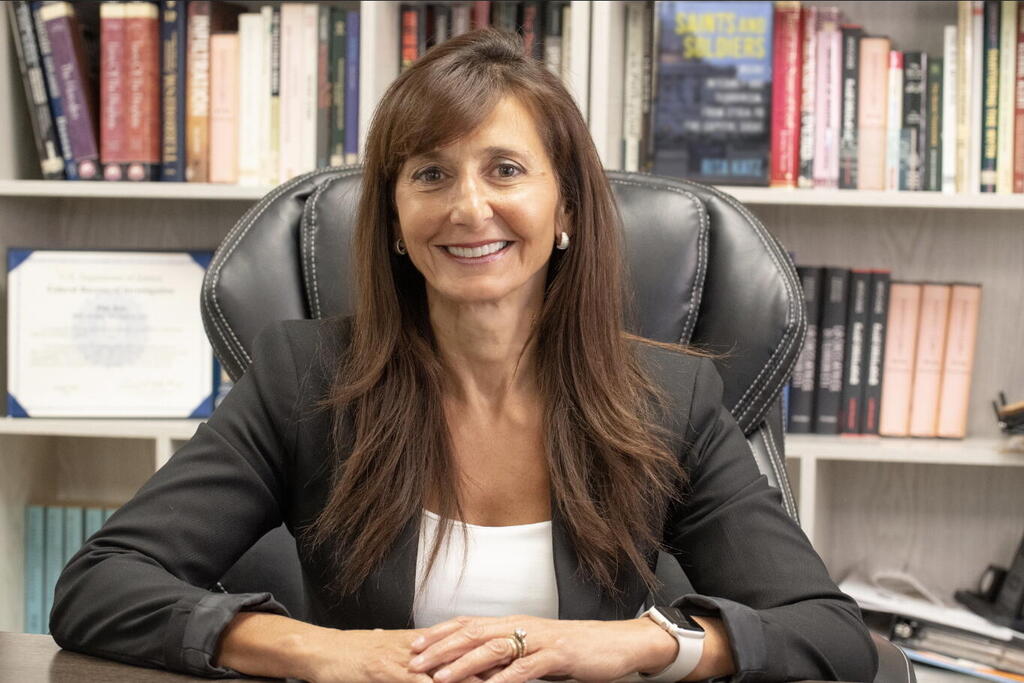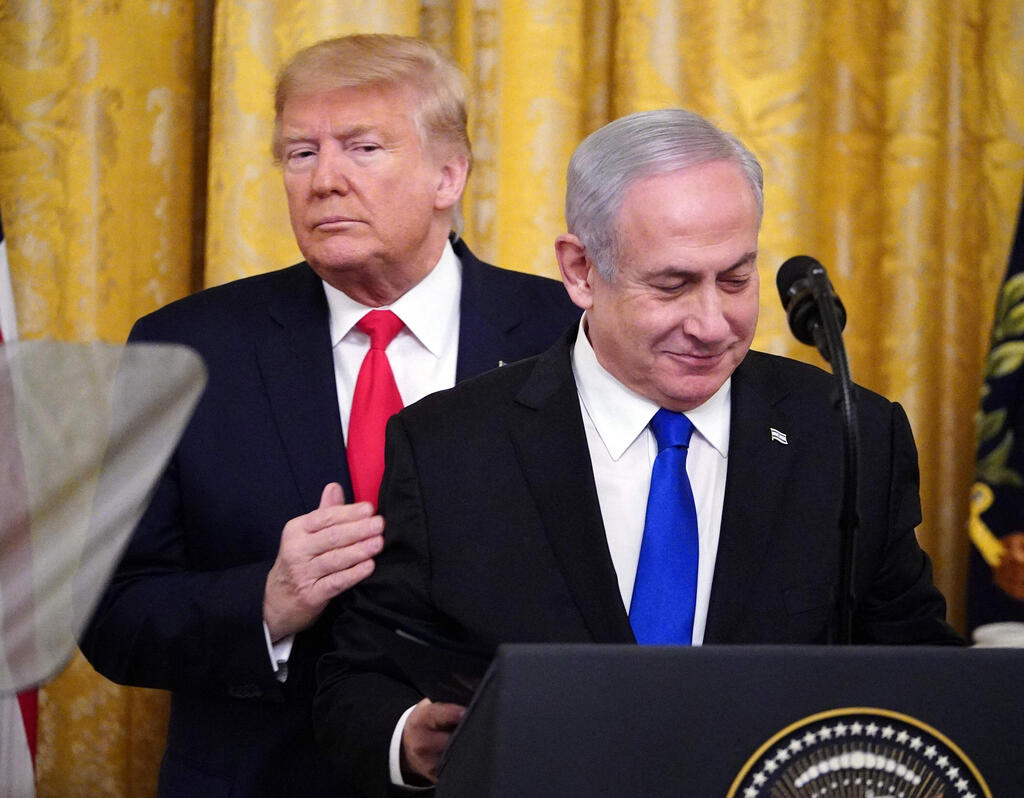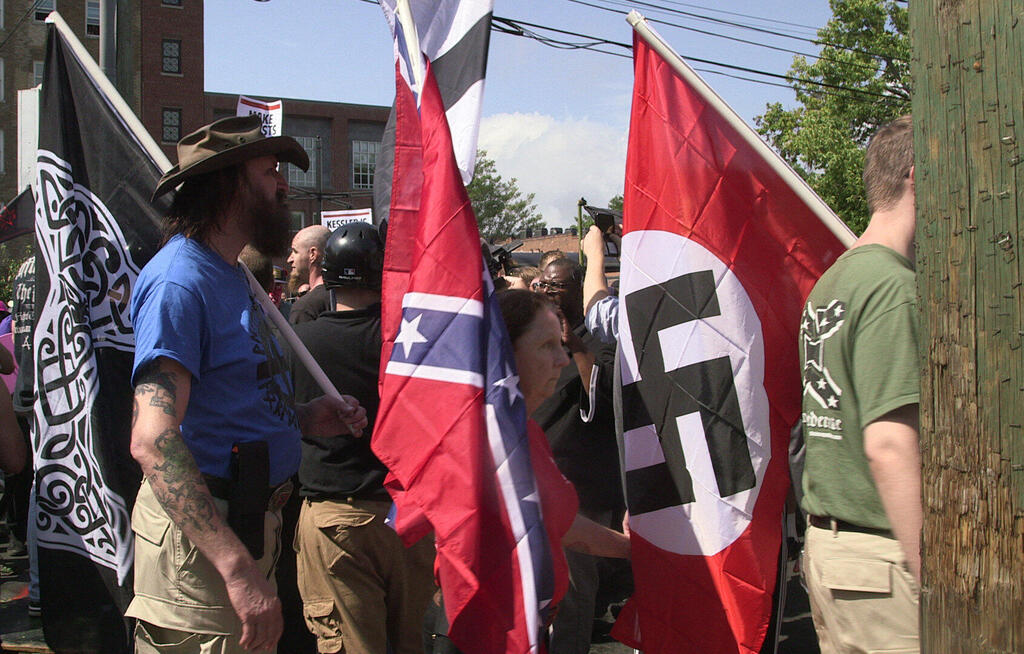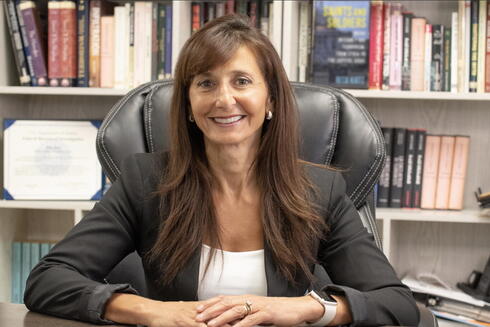
“I have no doubt that Donald Trump is anti-Semitic”
Rita Katz, whose father was hanged on charges of espionage in Iraq, has been the head of an American intelligence group that monitors and infiltrates extremist organizations, from Muslim jihadists to Christian alt-right movements, for 20 years. In a rare interview, she comes out of the shadows and warns the Jews of the United States: "Trump is the main culprit in the tsunami of anti-Semitism in the country. If he is elected, hatred against Jews will increase."
Rita Katz specializes in exposing jihadist organizations. With nearly three decades of experience in counterterrorism, she has operated undercover and even infiltrated these organizations’ activities. Katz is the CEO and co-founder of the American intelligence group SITE (Search for International Terrorist Entities), where her team monitors closed forums of extremist groups, tracks their activities, and reports on them as necessary. SITE's surveillance reports are sent to clients, including intelligence and law enforcement agencies in the United States and other Western countries, as well as intelligence and technology companies. Her insights are frequently cited in major media outlets, including ‘The Washington Post’ and ‘Politico’. Katz, 61, has testified before Congress as an expert and in terrorism trials. Her intelligence has contributed to the conviction of senior al-Qaeda figures and to the outlawing of charities financing terrorist groups, primarily Hamas, in the Middle East.
However, SITE’s work extends beyond Islamic terrorism. Since 2009, the organization has also monitored the online activities of far-right extremists in the United States. Among its contributions, SITE was one of the groups that alerted law enforcement to the potential for an attack on the U.S. Capitol by Donald Trump supporters on January 6, 2021. With the upcoming elections, Katz is increasingly worried that similar violent incidents could occur, especially if Trump wins. In an interview, she expressed deep concerns about escalating violence, particularly in the form of rising anti-Semitism. Katz believes that the return of the former president could lead to unprecedented levels of anti-Semitism, which has motivated her to speak publicly on political issues, something she rarely does. She emphasizes that her views are personal and not reflective of SITE’s official stance.
“No one bears more responsibility for the surge in anti-Semitism sweeping the United States than Donald Trump,” Katz states firmly. “If he is re-elected, the hatred against Jews will only increase.”
Anti-Semitism didn’t start with Trump.
"True, we saw an increase in anti-Semitism in the United States when Obama was elected president. The election of a non-white president made white supremacists feel threatened. During that time, we began to see a rise in racism against minorities, which always goes hand in hand with anti-Semitism. But the increase was moderate, without major attacks, mainly due to enforcement—people were arrested, and action was taken. But during Trump’s campaign, we started to see a concrete change. The way he spoke, the way he created division, made it clear there was a real risk that anti-Semitism would strengthen if he were elected."
Can you give an example?
"Trump has consistently refused to denounce anti-Semitic statements, and the far right has interpreted this as a wink of 'I'm with you.' Andrew Anglin, a known neo-Nazi (founder of the Daily Stormer, an American news site associated with the alt-right movement and named after the 'Der Sturmer', the propaganda weekly of the Nazi party), said in an interview in 2016 that he interpreted Trump's silence as support. Far-right communities started saying 'actually Trump is good for us, let's vote for him'. Indeed, at that time internet forums and conspiracy sites such as 4chan and 8chan started campaigning very strongly for Trump."
What was the first red flag for you?
"Just two weeks after Trump took office in February 2017, he signed an executive order changing the Countering Violent Extremism program to focus exclusively on radical Islam, removing white supremacy from its target list. White supremacists celebrated this. For them, it was one of the greatest things he could have done. On Stormfront, a major white supremacy forum we monitor, people wrote, ‘Now we can do what we want.’ We were troubled because this shift meant less oversight of their activities. Instead, they suggested we monitor Rita Katz and the SITE organization, claiming that they, Stormfront, were fighting terrorism. The result was a spike in hate crimes in America, but it wasn’t taken seriously."
Why wasn’t it taken seriously?
"At the time, the U.S. State Department and law enforcement agencies were focused on arresting jihadists tied to ISIS or al-Qaeda. On the other hand, investigating a neighbor who might be a white supremacist? That was less appealing, especially given their presence across the country. This double standard was striking."
Then, in 2018, came the attack on the Tree of Life Synagogue in Pittsburgh, where 11 people were killed.
"Exactly. That attack was a golden opportunity for Trump to say, ‘We must protect Jewish people and fight anti-Semitism,’ which would have provided moral clarity. Instead, he suggested, ‘If they were armed, the situation would be different,’ which is essentially victim-blaming. And this was a year after the right-wing rally in Charlottesville, where armed neo-Nazis surrounded a synagogue, chanting ‘Jews will not replace us.’ At that time, Trump’s response was, ‘There are very fine people on both sides.’"
Do you think Trump himself is anti-Semitic, or is it just a tactic?
"I have no doubt that he is anti-Semitic. Every move he has made has shown support for the far right and actions that fuel anti-Semitism. Just look at what has happened: the social network Gab, which attracts neo-Nazis and other extremists—including Robert Bowers, who killed 11 people in the Pittsburgh synagogue—thrived under him. Gab’s user base grew from half a million to 11 million. Gab claims to have supervision, but in reality, there’s little to none. The platform was created as an ‘alternative social network’ after Facebook and pre-Elon Musk Twitter shut down extremists’ accounts. On Gab, surrounded by like-minded individuals, hatred only grows. Users are radicalized and get ideas for attacks from others. Bowers found his inspiration for the Pittsburgh attack in a Gab group called ‘Gabstapo.’
"It’s crucial to understand: it may start with hatred of Jews, but it won’t stop there. We’ll start to see attacks against Black people, LGBTQ individuals, and anyone else white supremacy labels as a threat. Look at what happened the day after Trump’s Mar-a-Lago residence was raided. He said the FBI should be attacked, and the very next day, someone attacked an FBI office in Ohio. People believe him as if he’s a god, and it doesn’t matter what he says."
"Doesn't take account for his actions"
Katz's life story is unusual, and it is difficult to separate it from her unique career. She was born in Basrah, Iraq, in 1963, the daughter of Fouad and Salima Gabai, a businessman and a housewife. Against the backdrop of Israel’s establishment and with encouragement from the Ba'ath government, harassment of Iraq’s Jewish community increased. The situation reached a boiling point after the Six Day War, when Katz's father, like other prominent Jews in the community, was arrested and accused of spying for Israel. In January 1969, when Katz was six years old, Gabai was convicted and executed by hanging in Baghdad’s central square, in front of an audience of around half a million.
With unimaginable courage, Katz's mother managed to escape from house arrest with her children, crossed the border into pre-revolutionary Iran, and reached Israel, eventually settling in Bat Yam. As Katz grew up, she studied political science, Orientalism, and African studies at Tel Aviv University. In 1997, when her partner received a research scholarship in the United States and later a job offer, the family relocated there.
In 2022, Katz published her book ‘Saints and Soldiers’, covering terrorism in the age of social networks, from Syria to the Capitol attack. Almost 20 years earlier, in 2003, she published an unsigned memoir titled ‘The Terrorist Hunter’ (its Hebrew translation was published by Yedioth Ahronoth), documenting her life story, which is closely tied to Israel’s history. She describes hair-raising events, including infiltrating a “charity organization” conference under the guise of a seamstress with body recording equipment and cash. The intelligence she gathered helped prove that American-based charitable organizations were financing Middle Eastern terrorist groups. Among those she exposed was a man presenting himself as a Muslim human rights activist, who turned out to be a senior Hamas member.
What would you say to American Jews who believe Trump is the better option for Israel, partly because he recognized Jerusalem as its capital and supported it against Palestinian claims?
"I would tell American Jews that if you want peace in the Middle East, you need to vote for a reasonable person. Someone who doesn’t say, ‘I hate the Palestinians and love Israel.’ You need a leader who can tell both sides they are both right and wrong—that’s how you make peace. Trump causes war and hatred; he doesn’t account for his words or actions.
"His chief of staff reported Trump once said that ‘Hitler did some good things’ and that he wished military leaders would show him the same loyalty Nazi generals showed Hitler. This isa man who admires Vladimir Putin, who caves to Putin and wants to be like Hitler. In 2022, Trump even hosted Holocaust denier Nick Fuentes for dinner at his home. Trump will be dangerous. He gave the far right free rein with settlement projects, and it will only get worse."
But since October 7, anti-Semitism in the U.S. has skyrocketed even without Trump in power. Look at what’s happening on campuses.
"First things first: there is no such thing as peaceful antisemitism. All antisemitism is repugnant and innately violent.
"Having said that, white supremacists’ overt mission statement is based upon hatred of all Jews. When someone shows up at a Unite the Right rally in Virginia, there is no obfuscating their reason for being there: to forcefully declare that “Jews will not replace us”.
"The neo-Nazi and the most extreme far-right antisemites would like to see the Jews eliminated and have carried out mass shootings against Jews, whom they see as string-pullers behind a “white genocide.” Two days ago, was the six-year anniversary for bloody massacre of Jews in Pittsburg PA, (Oct 27, 2018), and that wasn’t the only one.
"Antisemitism from the far-left is different than that from the far right in America, materially speaking. Far-left antisemites have often intimidated Jewish students and businesses, carried out vandalisms, and cast all Jews as complicit in the killings of Palestinians.
"The anti-Jewish, anti-Israel hate we’re seeing from some pro-Palestine groups is horrid. These protests are carefully crafted by behind-the-scenes actors – many by radical groups who willingly and brazenly serve the interests of Iran and its terrorist proxies like Hamas and Hezbollah, and the PFLP to attract a much wider crowd, that includes young, impressionable do-gooders who are easily influenced by imagery of suffering Gazans. I do not believe that every single 19-year-old shouting "from the river to the sea" truly understands what it means and/or wants violence towards Jews, even if the statement itself is inherently harmful and antisemitic."
These protests are happening under the Biden administration.
"It’s true that the Biden Administration has clearly not stopped the surge of antisemitism since the October 7 attacks, though I would place more blame on universities and other institutions that had more direct power to stomp it out quickly but didn’t. In any case, it’s comforting to finally see the first substantive action against this trend, which was the joint US-Canada terrorist designation of Samidoun as “a sham charity” for PFLP, which has been very active in the U.S. campuses, Europe, and even south America. As someone who has helped craft designations against organizations like Holy Land Foundation (HLF) and the Islamic Association of Palestine (IAP) – both are Hamas front groups that operated in the United States, I’m aware of how long they can take to put in place—but also how worthwhile and impactful they can be."
Trump said that if he had been president, October 7 wouldn’t have happened and that the U.S. betrayed Israel when information about the attack on Iran was leaked.
"First, the Biden administration gave Netanyahu everything he wanted and continues to do so. Despite public disagreements over Israel's actions, Biden provides whatever Israel needs. American weapons have been used in major Israeli operations. As for leaks, there are always leaks; this is nothing new, and there’s no proof it was intentional. In contrast, in 2017, Trump gave the Russians secret information about an Israeli spy who had infiltrated ISIS, and Israeli intelligence considered cutting ties with the U.S."
Now Trump claims that if he loses, Jews will be largely responsible. He’s even said that if Harris is elected, Israel will cease to exist within two years.
"Israel will not cease to exist, regardless of who is elected. This is campaign rhetoric, and Trump is playing with American Jews’ emotions. I have been here for almost 30 years and I have never seen such a thing happen, that Jews suddenly think more about Israel than they think about themselves as American Jews. It’s a tectonic shift."
The far right learned from ISIS
Katz, who is deeply familiar with activity on extremist social networks, points to parallel between the American far right and jihadist movements. "ISIS and the far right share remarkably similar paths of formation and action," she says. "Both arose as splinters from broader movements, are skilled at using social media to recruit and build extensive network infrastructures, and prioritize actions over a unified ideology. At times, the far right has even directly followed ISIS’s online playbook, down to the exact platforms they use."
What about real-world similarities?
"Though ideologically opposed, these groups are similar in many ways. The first is their treatment of women. The far right's 'ideal woman' mirrors that of ISIS, Al-Qaeda, and other jihadist groups: a woman who stays at home, dresses modestly, serves her husband, and remains subservient. At first, this was hinted at subtly, but with the overturning of ‘Roe v. Wade’, which had established the right to abortion, the Supreme Court set women’s rights back by 50 years. With Trump’s re-election and figures like J.D. Vance as his allies, the country could become more religiously conservative, especially regarding women’s rights. This is the same Trump who said in 2016, 'grab them by the [explicit term],' and won male support for it."
Are there parallels in the types of attacks they carry out?
"Both groups leverage events to inflame hatred, which then leads to violence. Take what’s been happening in Europe since October 7: ISIS, after years of relative quiet, resurfaced with attacks in Europe. An attack in Russia killed 144 people, and a major attack planned at a Taylor Swift concert in Austria was narrowly thwarted. This new wave of ISIS threats is largely carried out by a younger generation—teenagers aged 16-18—who didn’t witness ISIS’s peak but are drawn in by the group’s rhetoric of 'protecting Muslims.' For example, in England this July, three girls were murdered at a dance camp for Taylor Swift songs. The day after, conspiracy theories falsely claimed the killer was a Muslim asylum-seeker, sparking violent anti-Muslim demonstrations throughout the UK. The British public already harbored resentment, but this rumor gave it an outlet.
"We’ve also seen significant Russian influence. The Quran burnings in Sweden and elsewhere were funded by Russia, aiming to incite hatred and destabilize. Iran employs similar tactics, inciting hostility to create unrest. By stoking resentment, they hope to spark broader social instability."
Why is this happening mainly in Europe?
"Attacks by Muslim extremists are more common in Europe than the U.S. because many immigrants from Syria and other Muslim-majority countries have settled there. In recent years, the far right has also grown in Europe, attacking Muslim immigrants and their communities, setting fires, and heightening mutual animosity. When hatred builds on one side, it often ignites a response on the other. This means that when ISIS calls for attacks, those already resentful of Europeans are easily mobilized. Most attacks end up targeting Christians. Meanwhile, in the U.S., Trump similarly stirs up hatred toward immigrants."
If Harris wins the election, will we see another January 6? Are there plans on right-wing forums?
"Yes, absolutely. We’re expecting something bigger than January 6. Based on current conversations, Trump’s supporters are not willing to accept the election results. Trump himself is signaling that they should resist."
The dream of being buried in Israel
In her personal book, Katz recounts the traumatic experience she endured as a child when her father was arrested in front of her in Iraq. "One afternoon, officers stormed into our home, breaking down the doors. They arrived in a dark blue Volkswagen van, forced their way in, and arrested my father. They ripped the transformers from our air conditioner, claiming they were radio transmitters. I remember every detail of that horrifying scene... Today, I know that, along with around a hundred other Iraqi Jews, my father was arrested and accused of spying for Israel. But at the time, all I understood was that something terrible had happened. My mother never spoke to us about it, and Jonathan, sensing the danger, tried to defend my father. I remember how they threw him onto the iron railing, how he fell to the floor. As his head bled onto the marble, my brother, barely four years old, clung to my father and refused to let go. That day left scars on all of us, but my wounds are internal; I carry them in my soul. My mission, my determination, everything I do in life, comes from those same scars."
Does your father’s story still affect you today?
"Yes. My dream is to bring him to Israel for burial. He is buried in an old cemetery in Baghdad, now under Shiite control, and we have photos of the graves. At the time, I didn’t understand the magnitude of his execution, nor did I even know he had died. My mother never told me or my brother. I used to dream of my father returning, of saying to him, 'Hey Dad, thank you for coming back. We missed you.' When I was 17, I found materials from his trial, including an article with a picture of him hanging. They took him down from the noose, and he had no fingernails from the torture he endured."
Do you know if he was actually a spy?
"We can't be sure. Over the years, I've developed the theory that something more was involved. We've made many attempts to access the files and understand what happened, but were told the documents are classified for 50 years. That time has passed, but the files in Israel remain sealed—only recently they extended the restriction for another 50 years. There’s no reason for this; Saddam Hussein’s regime is gone, and it’s hard to argue that releasing the information would affect any current relations. Yet, we’re given no answers. What was my father's role? Was he a spy? What happened that led to his execution? Other young men were hanged with him.
"My father was accused of being the leader of the group. From American State Department documents that were recently declassified, I learned that his case was a significant issue not only in the Middle East but also in the West. There were telegrams exchanged between countries, and no one expected that he and the others would be executed. Efforts were made to save them, but Saddam Hussein simply carried out the executions. We still don’t know if the Iraqis’ evidence was genuine."
Do you think this dramatic story influenced your career?
"First of all, I look very much like my father. Out of all my siblings, I resemble him the most, especially in my nose and eyes. Beyond that, it must be in my genes; I don’t know what else to say... What I went through, what we went through as a family, made us who we are. That can’t be separated. Because of the trauma I endured in Iraq, being Jewish felt like nothing but suffering. I remember asking myself why my parents brought me into the world as a Jew. Even after we arrived in Israel, it didn’t stop. The Yom Kippur War broke out a few years after we arrived, and some of our neighbors never returned."
How did you end up in the United States?
"Before my father was killed, he told my mother, 'Take the children and go to Israel.' For me, life here is about survival and resilience. But then came the intifada, with waves of attacks, explosions, and stabbings everywhere. Even on the happiest holiday, Purim, something would always happen, deliberately timed to ruin the day. So we didn’t dress up; the kids stayed home. Around the same time, my husband received a job offer in the United States. Ironically, we moved partly to escape terrorism. I thought to myself, 'I'm going to live in a place where I'll say I'm Jewish and everything will be fine,' and today I'm really suffering from all this. And yet, I'm still proud to be Jewish and proud to say everything I have to say."





